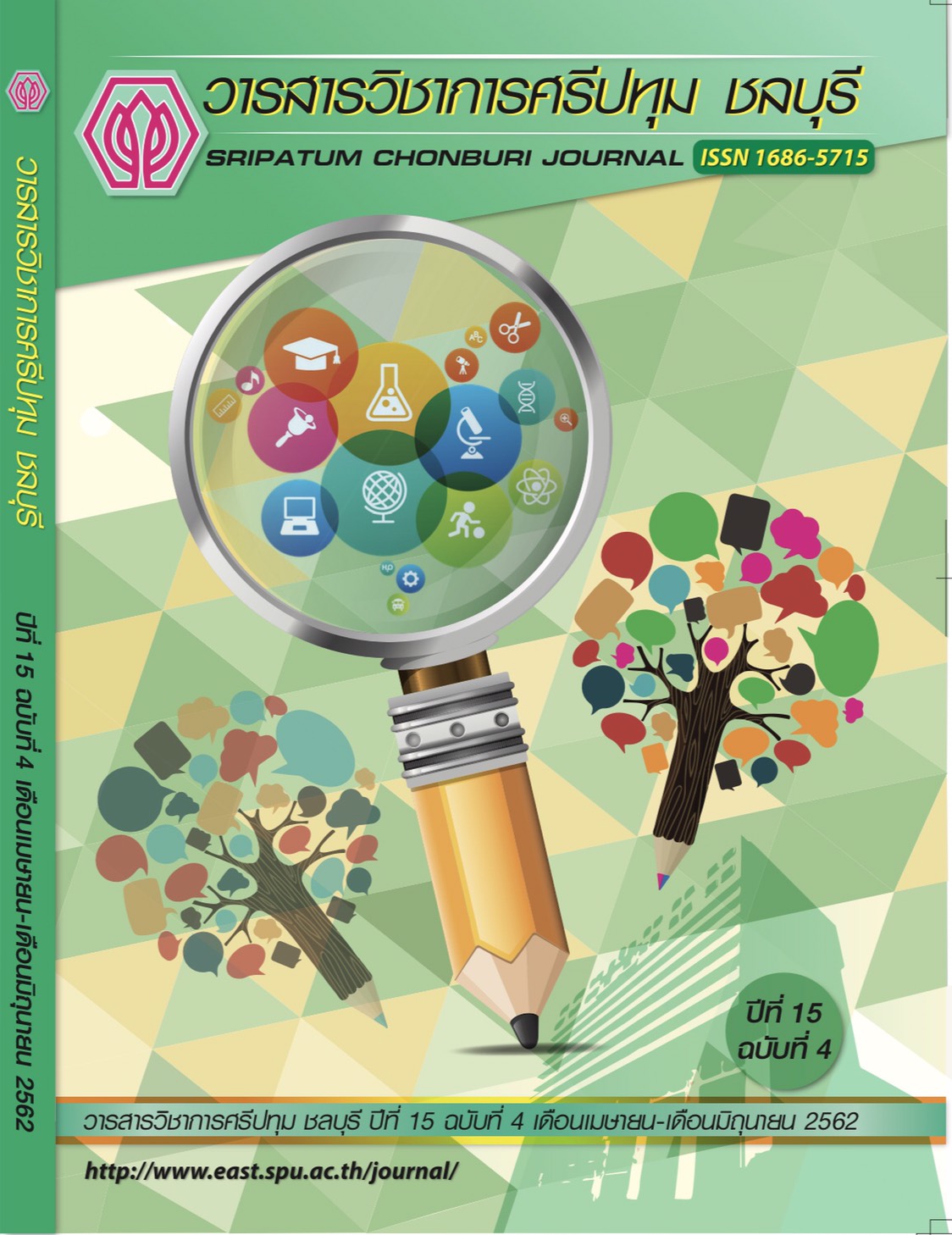THE DEVELOPMENT OF GRADE 10th STUDENTS’ ARGUMENTATION SKILLS IN NUCLEAR ENERGY TEACHING PLANS USING SOCIO-SCIENTIFIC ISSUE
Keywords:
argumentation skills, socio-scientific issue, nuclear energyAbstract
The objective of this research was to develop 10th grade students’ argument skills through socio-scientific issue. The participants were 33 10th grade students who have studied in fundamental science subject (physics) from one of high schools in central region. The research sample was chosen by selecting purposive sampling method. The data was collected from the argument skills test with open-ended questions on one socio-scientific issue regarding nuclear energy. There are 4 questions and 3 lesson plans about nuclear energy. The argument skills consisted of 4 components which were claim and warrant, evidence, counter claim and rebuttal. The quantitative data were analyzed by means (4 level rating scale), frequencies and percentages, as well as the qualitative data was analyzed by content analysis. The result showed that students developed their argumentation skills from improvement level to excellent, good and fair level. The best components that students developed were claim and warrant in excellent level (= 3.27). At the same time, the good level of components were in counter claim and rebuttal (
= 3.09 and
= 2.58 respectively), and the lowest components in fair level were evidence (
= 2.48).
References
ณัฏฐ์พธู เสริมสุข, ศศิเทพ ปิติพรเทพิน และอุทัยวรรณโกวิทวที. (2558). การพัฒนาทักษะการโต้แย้งของ
นักเรียนระดับชั้นมัธยมศึกษาปีที่ 4 หัวข้อ ชีวิตกับสิ่งแวดล้อม โดยการจัดการเรียนรู้โดยใช้ประเด็น ทางสังคมที่เกี่ยวเนื่องกับวิทยาศาสตร์. ใน การประชุมวิชาการระดับชาติ มหาวิทยาลัยรังสิต ประจำปี 2558 (หน้า 1348-1355). กรุงเทพฯ: มหาวิทยาลัยรังสิต.
ประภา สมสุข. (2558). การพัฒนารูปแบบการจัดการเรียนรู้วิชาฟิสิกส์ที่ใช้การโต้แย้งเชิงวิทยาศาสตร์แบบ 2I3C สําหรับนักเรียนระดับชั้นมัธยมศึกษาตอนปลาย. การค้นคว้าอิสระการศึกษาดุษฎีบัณฑิต สาขาวิชาวิทยาศาสตร์ศึกษา, บัณฑิตวิทยาลัย มหาวิทยาลัยศรีนครินทรวิโรฒ.
สำนักงานคณะกรรมการการศึกษาขั้นพื้นฐาน. (2560). หลักสูตรแกนกลางการศึกษาขั้นพื้นฐาน พุทธศักราช 2551 (ฉบับปรับปรุง พ.ศ. 2560). กรุงเทพฯ: กระทรวงศึกษาธิการ.
อัศวิน ธะนะปัด, ศศิเทพ ปิติพรเทพิน และพัฒนี จันทรโรทัย. (2558). การพัฒนาทักษะการโต้แย้งของ
นักเรียนชั้นมัธยมศึกษาปีที่ 4. วารสารวิจัยมหาวิทยาลัยขอนแก่น ฉบับบัณฑิตศึกษา, 3(2), หน้า 14- 24.
เอกภูมิ จันทรขันตี. (2559). การจัดการเรียนการสอนเพื่อส่งเสริมทักษะการโต้แย้งในชั้นเรียนวิทยาศาสตร์.
วารสารมหาวิทยาลัยราชภัฏยะลา, 11(1), หน้า 217-232.
Cavagnetto, Andy R. (2010). Argument to foster scientific literacy: A review of argument interventions
in K-12 science contexts. Review of Education Research, 80(3), pp. 336-371.
Cetin, S. P., Dogan, N., & Kutluca, A. Y. (2014). The quality of pre-service science teachers’ argumentation: Influence of content knowledge. Journal Science Teacher Education, 25, pp. 309-331.
Christenson, Nina, Gericke, Niklas, & Chang Rundgren, Shu-Nu. (2017). Science and language teachers'
assessment of upper secondary students' socio-scientific argumentation. International Journal
of Science and Mathematics Education, 15(8), pp. 1403-1422
Espeja, Anna Garrido, & Lagaron, Digna Couso. (2014). Socio-scientific issues (SSI) in initial training
of primary school teachers: Pre-service teachers’ conceptualization of SSI and appreciation of the value of teaching SSI. Procedia-Social and Behavioral Sciences, 196, pp. 80-88.
Foong, Chan-Choong, & Daniel, Esther Gnanamalar Sarojini. (2010). Assessing students' arguments made in socio-scientific contexts: The considerations of structural complexity and the depth of content Knowledge. Procedia Social and Behavioral Sciences, 9, pp. 1120-1127.
Lin, S., & Mintzes, J. J. (2010). Learning argumentation skills through instruction in socioscientific issues: The effect of ability level. International Journal of Science and Mathematics Education, 8(6), pp. 993-1017.
Sampson, V., & Blanchard, M. R. (2012). Science teachers and scientific argumentation: Trends in views and practice. Journal of Research in Science Teaching, 49(9), pp. 1122-1148.
Published
Issue
Section
License
บทความทุกบทความเป็นลิขสิทธิ์ของวารสารวิชาการศรีปทุม ชลบุรี



